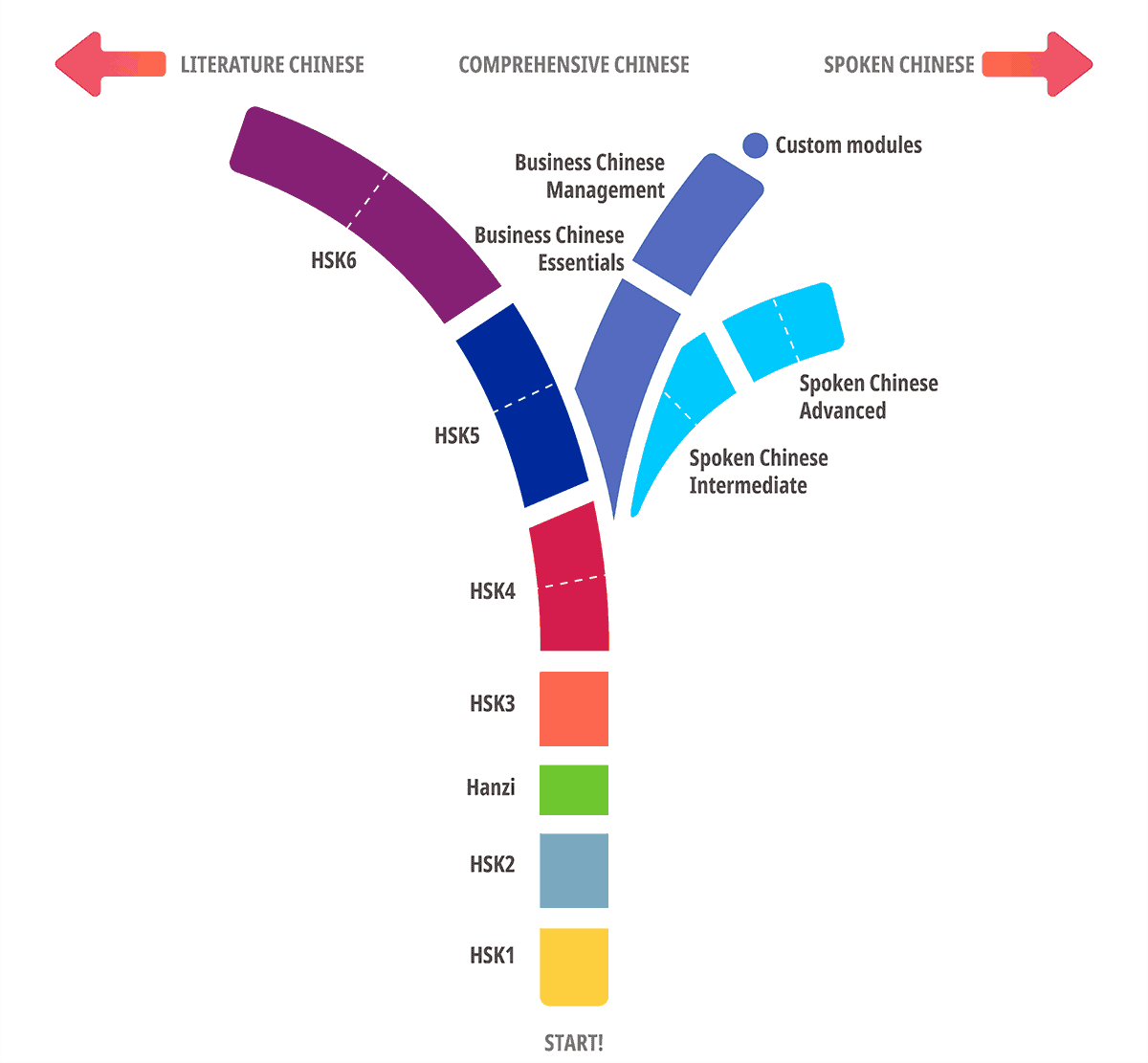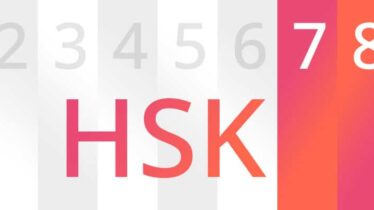Au-delà du HSK : à propos des autres cours de langue chinoise
HSK is how your Chinese language skills are officially graded, and as such, they’re often seen as the only way to learn Chinese. Which is a pity, because every Mandarin student’s goals are different. For some Chinese learners, HSK5 & HSK6 are perfect, for others, not so much.

If you’ve completed HSK6 you will have learned around 2,600 characters, while the average Chinese person who went to university will know around 5,000. There are so many characters out of HSK6. In fact, the most famous Chinese dictionary (汉语辞典) lists 23,000 unique Chinese characters, and says these can be combined into 370,000 unique Chinese words (whereas after HSK6 you’ll have learned 5,000 words). This is not to demotivate you: HSK6 is a very high level, but it’s not all: there are many topics not included.
Why it’s important
To master HSK5 & HSK6 take up way more time than HSK1 to HSK4 combined (264 advised class hours minimum for the latter versus 552 for the former.) HSK level 5 is also where lots of eager students lose motivation. Yes, they’re burdened by the increased vocabulary and complexity, but most of all it’s the loss of relevance that takes the joy out of learning for them. To lose your joy of learning Chinese is something we want to avoid at all costs.
HSK 1 to HSK4 is perfect to get you conversational…
The HSK1 to HSK4 courses are perfect to get you speaking. At GoEast Mandarin we’ll add in a few words such as “这是什么?” or “这个东西叫什么?” so that you can ask others what something is, and make that another part of your language. This is already an example of making you learn words in a way that allows you to learn even more words.
HSK levels are also popular so there’s also tons of content online to be found for it. You can listen to an HSK3 vocabulary list while you do your workout, download HSK5 mock-tests, go into Quizlet for flashcards on specific chapters of your book, or look up a specific grammar structure. Other courses do not have these benefits.
…but from HSK5 onwards, the books & learning goals sometimes drift apart
HSK4 already increasingly gets into written language, to the point where HSK5 and 6 are very much literature-based. HSK5 and 6 are not relevant in their entirety if you just want to make casual chat with Chinese people, or want to work in China.
Here’s a sample from the first HSK5 book:
例如著名的文学家鲁迅,在吃喝这件事上,就算是个地道的行家,不但会吃,还会亲自动手做,对许多美食都有独特的见解。这是近代新时尚。
For example, the famous writer Lu Xun is indeed an authentic expert in eating and drinking. He will not only eat, but also cook it himself. He also has many unique insights of different cuisines. This is the new fashion of modern times.
The text used for the lesson is a contemporary essay about Lu Xun, a famous Chinese writer born in 1881. Not only is this sentence extremely long and formal, 近代 means ‘modern times’, but in this text that refers to China from mid-19th century and 1919 in Chinese history.
Sample sentence Business Chinese:
企业面临着两个市场,即本土销售和国际销售。全球市场一体化后,任何一个国家的风吹草动都会波及到你的企业。
Enterprises faces two markets, namely local sales and international sales. After the global market is integrated, the turmoil in any country will affect your business.
Sample sentence Spoken Chinese:
我知道在节假日出去旅游都是去看人,但有什么办法呢?我只有这个时候有空,平时工作真的抽不出时间呀。
I know that when traveling on holidays is just to see people, but what else can I do? I only have time at these days, and I am really busy with work usually.
Do you need HSK5 for small talk in China?
It’s really difficult to answer this question, but in our experience, you can be comfortable having conversations starting from HSK3. With HSK4 you get more and more comfortable, whereas HSK5 does improve on that fluency, but also because during HSK5 you get more and more comfortable with the words from HSK3 and 4.
If small-talk in China is your learning goal, we definitely suggest that after HSK4 you continue with Spoken Chinese courses.
Not a matter of difficulty, rather a change of topics
Business Chinese prepares you for working in China, whereas Spoken Chinese is spoken language, somewhat informal. Let’s take the topic of your job. In Business Chinese you’ll learn how to talk about job responsibilities with your HR managers. In Spoken Chinese you’ll learn how to talk about jobs with your friend during coffee.
Quand choisir des cours de chinois des affaires
- You want to speak mostly in formal business situations or write business emails
- Vous souhaitez que les mots et les structures grammaticales que vous connaissez déjà fassent partie de votre discours naturel, et améliorer la variété des mots prononcés, en particulier dans un contexte professionnel.
- Vous voulez paraître plus fluide et mature au bureau ou lors de présentations
Quand choisir des cours de langue parlée
- Vous souhaitez que les mots et les structures grammaticales que vous connaissez déjà fassent partie de votre discours naturel et améliorer la variété des mots prononcés, en particulier dans les situations informelles.
- You want to be better at speaking Chinese in everyday conversations and sound more fluent and spontaneous
Quand continuer avec les livres du HSK à la place
- You want to focus on written Chinese and improve your reading and writing ability
- Vous souhaitez passer l'examen officiel HSK5 ou HSK6, par exemple pour entrer à l'université ou pour obtenir un visa.
- You want to study the Chinese language as a linguistic or translator or historian
Ces trois options font progresser votre mandarin, mais de manière différente.





